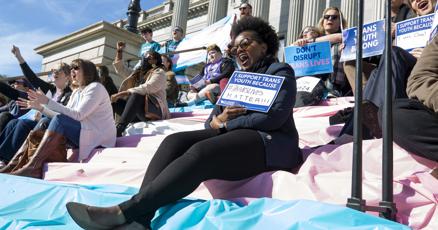
COLUMBIA — The South Carolina superintendent of education recommended school districts disregard new federal regulations that would expand the definition of sex discrimination under Title IX to protect gay, lesbian and transgender students.
“South Carolina students are not pawns to be sacrificed in cynical political gambits,” Republican Ellen Weaver wrote in an April 23 memo to the state’s superintendents.
“Accordingly, our State will defend the inherent dignity of every person, while refusing to upend long-standing federal law, violate common sense, or acquiesce to radical attempts to redefine biological reality by bureaucratic diktat,” she said.
Weaver wrote in the memo that she expects the rules, which will take effect Aug. 1, to be swiftly challenged in the courts and enjoined.
The memo, which frames the superintendent as a defender of South Carolina schools from “divisive distractions from Washington,” is the latest example of Weaver taking a more political approach to the office than her predecessors. She is in her second year in office.
The federal Department of Education did not respond to a request for comment by print deadline. The South Carolina Daily Gazette first reported Weaver’s memo.
The Biden administration has said the rules will ensure schools are protecting gay, lesbian and transgender students, who are often the targets of bullying and discrimination. The new regulations make “crystal clear that everyone can access schools that are safe, welcoming and that respect their rights,” Education Secretary Miguel Cardona told reporters recently.
The rules would also undo some of the changes the Trump administration made to sexual misconduct proceedings, but those provisions, which are also controversial, apply only to colleges and universities.
Advocates for the LGBT community in South Carolina slammed Weaver’s memo, arguing that the superintendent is endorsing discrimination.
“While Superintendent Weaver may not personally support the rights of LGBT+ students, she has the responsibility as the top school leader in our state to ensure that all students have equal rights and protections,” Chase Glenn, executive director of the Charleston-based Alliance for Full Acceptance, said in a statement.
The memo, Glenn said, “tells me our superintendent unfortunately does not have the best interests of all students in mind.”
Charleston-area school districts were largely mum on what they will do April 24.
The Berkeley County School District told The Post and Courier it is still reviewing the new regulations, which run more than 1,500 pages.
“As we move forward, we will carefully consider whether to implement them, taking into consideration Superintendent Weaver’s recommendation and the litigation that is sure to follow,” BCSD spokeswoman Katie Orvin Tanner wrote in a statement.
The Charleston County School District had no comment, as did Dorchester District Two, which predominately covers Summerville and the more populous part of the county.
Scott Price, executive director of the South Carolina School Boards Association, said districts will need to consult with counsel about their specific policies.
“We would never tell them to not follow the law,” Price said. “Right now, until a court says otherwise, they have until Aug. 1 to comply with the federal regulations.”
Weaver is likely right that a court will stall the regulations, and schools won’t actually face a choice between following federal law or defying the superintendent this summer, Price said.
The new regulations would mean schools could not treat gay, lesbian, bisexual, intersex and transgender students differently than their peers. For instance, the new rules would likely upend school policies that require transgender students to use the bathroom that conforms to their sex determined at birth, according to The Associated Press.
If LGBT students believe they have been discriminated against based on their sexuality or gender identity, they would be entitled to a response from their school and could appeal to the federal government.
Weaver’s letter notes that the regulations could compel teachers to use students’ preferred pronouns and argues it would impose burdensome legal costs on districts.
The new regulations do not mention transgender students’ participation in high school sports, which has become a political flashpoint. A draft of the new regulations initially contained a provision that would explicitly prevent schools from implementing a blanket ban on transgender students from participating in sports aligned with the gender identity, which Republicans, including Weaver, vocally opposed.
Those sections did not make it into the final rule, but advocates on both sides of the issue believe that, though not spelled out explicitly, the new rules would make it difficult for schools to entirely bar transgender students from sports, The Associated Press reported.
Weaver’s letter argues that the authors of Title IX, originally passed in 1972, never intended for their rules to extend to gay and transgender people.
“This is not fairness: it is fiat,” she wrote.
The intent of Title IX was always to prevent all sex discrimination, Glenn said.



